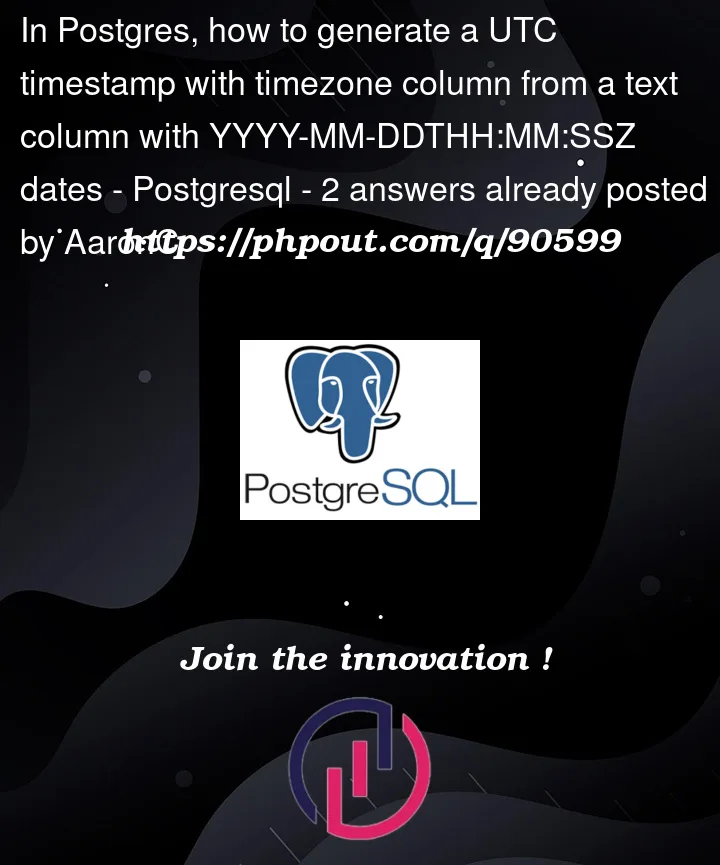My table has a "Timestamp" column (text type) with YYYY-MM-DDTHH:MM:SSZ formatted dates. I want to generate a timestamptz formatted column with a continuous UTC timestamp but have been unable to do it. I have tried many methods suggested in forums and documentation but I have not been able to get anything to work.
Here is a data example from the table:
select "Timestamp",("Timestamp"::timestamp with time zone) from public.time_177168 limit 1
This returns:
"2022-12-10T04:10:02-06:00" (Text) and "2022-12-10 10:10:02+00" (timestamp with time zone)
Here are a few examples of my attempts to generate the new column but they all return:
ERROR: generation expression is not immutable SQL state: 42P17
Attempt 1:
alter table public.time_177168 ADD COLUMN "TimestampUTC" timestamp with time zone GENERATED ALWAYS AS ("Timestamp"::timestamp with time zone) STORE
Attempt 2:
alter table public.time_177168 ADD COLUMN "TimestampUTC" timestamp with time zone GENERATED ALWAYS AS ("Timestamp"::timestamp AT TIME ZONE 'ETC/UTC') STORED
The overall goal is to be able to quickly order queries by UTC time. I am not able to change the data type for the existing "Timestamp" column because of legacy applications that use this database.
Any ideas or suggestion would be greatly appreciated.
Additional Information:
Using the solution below I was able to get the query performance to an acceptable level.
Original Query:
EXPLAIN ANALYSE SELECT "Timestamp","Column1","Column2","Column3" FROM time_177168 WHERE "Timestamp">'2022-11-06T00:59:00-06:00' ORDER BY ("Timestamp"::timestamp with time zone) limit 5000
Query Plan:
Limit (cost=125360.32..125943.69 rows=5000 width=81) (actual time=5826.521..5828.301 rows=5000 loops=1)
-> Gather Merge (cost=125360.32..198037.52 rows=622904 width=81) (actual time=5826.520..5827.743 rows=5000 loops=1)
Workers Planned: 2
Workers Launched: 0
-> Sort (cost=124360.29..125138.92 rows=311452 width=81) (actual time=5826.186..5826.712 rows=5000 loops=1)
Sort Key: ((Timestamp)::timestamp with time zone)
Sort Method: top-N heapsort Memory: 1089kB
-> Parallel Seq Scan on time_177168 (cost=0.00..103667.87 rows=311452 width=81) (actual time=0.136..5302.325 rows=747701 loops=1)
Filter: (Timestamp > '2022-11-06T00:59:00-06:00'::text)
Rows Removed by Filter: 438784
Planning Time: 0.145 ms
Execution Time: 5829.070 ms
New Query (Based on Accepted Solution)
EXPLAIN ANALYSE SELECT "Timestamp","Column1","Column2","Column3" FROM time_177168 WHERE "Timestamp">'2022-11-06T00:59:00-06:00' ORDER BY "TimestampUTC" limit 5000
Query Plan:
Limit (cost=0.43..2793.20 rows=5000 width=81) (actual time=728.625..748.371 rows=5000 loops=1)
-> Index Scan using timestamputc_time_177168 on time_177168 (cost=0.43..417511.91 rows=747486 width=81) (actual time=728.623..747.778 rows=5000 loops=1)
Filter: (Timestamp > '2022-11-06T00:59:00-06:00'::text)
Rows Removed by Filter: 438784
Planning Time: 0.134 ms
Execution Time: 756.844 ms




2
Answers
Check out this informative answer to a somewhat similar question.
This might do the trick for you:
Try adding
AT TIME ZONE 'UTC'to it.As long as you know the function is truly immutable, you can just declare it as such. So create a function like:
That is safe, because
timezoneis fixed while the function is running.Such a function can be used to define a generated column using the following steps: